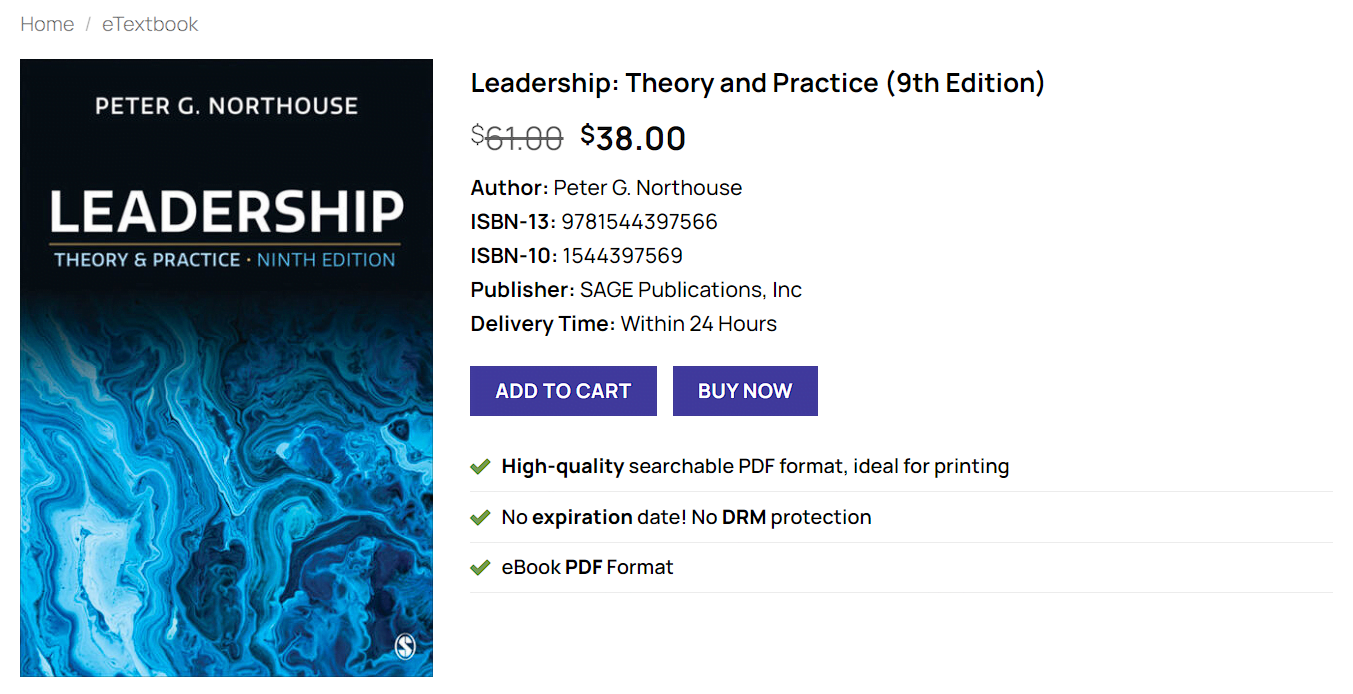“Leadership: Theory and Practice” 9th Edition by Peter G. Northouse stands as a seminal text in the field of leadership studies. This edition continues to uphold its reputation as a comprehensive resource, widely utilized in both academic and professional settings. The book’s significance lies in its ability to bridge theoretical concepts with practical applications, making it an invaluable guide for understanding leadership.
Peter G. Northouse, a distinguished scholar in leadership studies, has meticulously crafted this edition to cover a broad spectrum of leadership theories and models. His extensive background and contributions to the field lend considerable authority to the content, ensuring readers receive insights grounded in both research and practice. The book is structured to offer an in-depth exploration of various leadership theories, including trait, behavioral, contingency, transformational, and authentic leadership models.
The 9th Edition is particularly noteworthy for its balanced approach, presenting complex leadership theories in an accessible manner. Each chapter delves into specific models, providing detailed explanations, real-world examples, and practical applications. This structured format assists readers in not only understanding the theoretical underpinnings of leadership but also in applying these concepts to real-world scenarios. The inclusion of case studies and interactive elements further enhances its practical appeal, making it relevant for leadership practitioners.
Northouse’s work is characterized by its clarity and depth, making it suitable for a diverse audience ranging from students to seasoned professionals. The book’s enduring popularity can be attributed to its ability to evolve with the ever-changing landscape of leadership studies, incorporating the latest research and emerging trends. As such, “Leadership: Theory and Practice” 9th Edition remains an essential text for anyone seeking to deepen their understanding of leadership and its practical applications in modern organizational contexts.
Key Concepts and Principles in Leadership: Theory and Practice 9th Edition
The “Leadership: Theory and Practice 9th Edition” delves into a comprehensive array of leadership theories, each providing unique insights into effective leadership. Among these, transformational leadership stands out by emphasizing the role of leaders in inspiring and motivating their followers. This theory focuses on creating significant change within an organization by fostering a shared vision and encouraging innovation. For example, a transformational leader in a corporate setting might drive a company-wide initiative to adopt sustainable practices, thereby aligning organizational goals with broader environmental objectives.
Another significant theory explored is servant leadership, which centers on the leader’s role in serving their followers. This approach prioritizes the needs of employees, ensuring their growth and well-being. In practice, a servant leader might implement employee development programs and promote a culture of open communication, thereby enhancing overall team performance and job satisfaction.
Authentic leadership is also a key concept discussed in the book. This theory emphasizes the importance of leaders being genuine, transparent, and true to their values. Authentic leaders build trust and foster strong relationships by consistently demonstrating integrity and ethical behavior. For instance, an authentic leader might navigate a corporate crisis by openly communicating challenges and working collaboratively with the team to find solutions.
The book provides practical tools and strategies for developing effective leadership skills. These include self-assessment exercises, reflective practices, and case studies that enable leaders to apply theoretical concepts to real-world scenarios. Additionally, the importance of ethical leadership is underscored, highlighting the need for leaders to act with integrity and prioritize ethical considerations in decision-making processes.
Diversity and “Leadership: Theory and Practice” 9th Edition in leadership are also emphasized as crucial elements for modern organizations. The book advocates for creating inclusive environments where diverse perspectives are valued and leveraged for organizational success. By embracing diversity and inclusion, leaders can foster innovation, enhance employee engagement, and drive better business outcomes.

